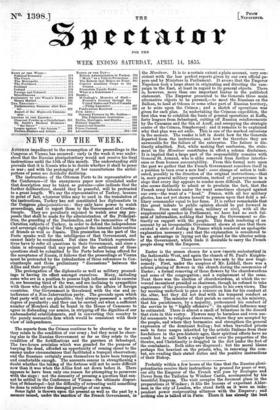NEWS OF THE WEEK.
ANOTHER impediment to the resumption of the proceedings in the Congress at Vienna has occurred : early in the week it was under- stood that the Russian plenipotentiary would not receive his final instructions until the 15th of this month. The understanding still prevails that it is Russia who is to decide whether it shall be peace or war ; and with the prolonging of her consultations the antici- pations of peace are decidedly declining. The instructions of the Ottoman Porte to its representative at the Conference—if the anonymous paper now circulated under that description may be taken as genuine—also indicate that the further deliberations, should they be peaceful, will be protracted to a great length; We say the representative of Turkey, because in point of fact, whatever titles may be used in the translation of the instructions, Turkey has not constituted her diplomatists in the Congress plenipotentiaries ; they only have power to watch proceedings, and to report them to the Government at Constan- tinople. They are peculiarly enjoined to watch over any pro- posals that shall be made for the administration of the Principal- ities, the guarding of the Dardanelles, and the immunities of the Christian subjects of Turkey, in order to defend the independence and sovereign rights of the Porte against the internal intervention of friends as well as Russia. This precaution on the part of the Porte swell for the intelligence of that Government, and cannot Kart; be condemned. But since the Turkish representa- tives have to refer all questions to their Government, and since a claim is advanced that any project for the settlement of those ' questions shall be submitted to the Porte before being offered for the acceptance of Russia, it follows that the proceedings at Vienna must be protracted by the introduction of those references to Con- stantinople and those preliminary " discussions" between the Allies and their protege.
The prolongation of the diplomatic as well as military proceed- ings is having its effect amongst ourselves. Many, including some who are in a position to possess high influence and to exercise it, are becoming tired of the war, and are inclining to sympathize with those who object to all intervention in the affairs of foreign countries. Our Government is threatened with the rise and in- terference of a Non-Intervention party. The grounds upon which that party will act are plausible; they always possessed a certain degree of popularity ; and they can be carried out when a sufficient number of Members shall be found in the House of Commons to agree in disbanding our armies, in stripping off the dignities of our ambassadorial establishments, and in converting this country to the purely mercantile firm which would be consistent with their view of independence.


























